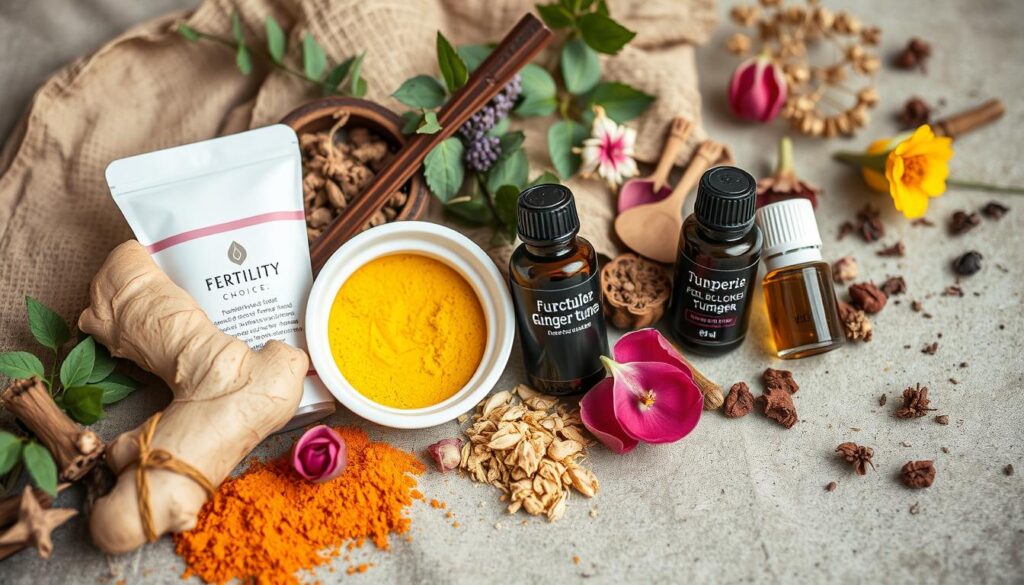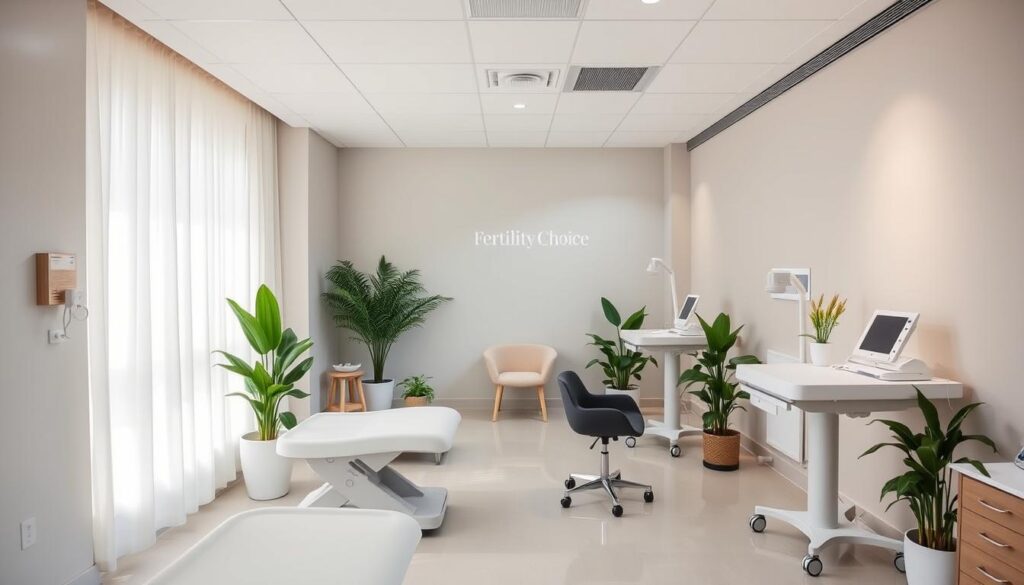
For those facing blocked fallopian tubes, there are treatments like medicine and natural remedies. These can boost the chances of getting pregnant. IVF has helped millions worldwide with blocked tubes to conceive1. In South Africa, more people are looking for ways to overcome infertility. Adding natural remedies to medical treatments can also help improve fertility.
Blocked fallopian tubes cause about 25% of infertility2. IVF is a top choice for many. It combines medicine and natural remedies to help people conceive. For over 30 years, IVF has been a reliable treatment for infertility1. Success rates depend on many factors, like the clinic and the patient’s situation.
Blocked fallopian tubes are a common reason for infertility, affecting about 25-35% of cases3. This issue can greatly affect a woman’s ability to have children. It’s important to know the causes and signs to get the right treatment. Some women find alternative and holistic methods helpful alongside traditional treatments.
There are several reasons why fallopian tubes get blocked, like endometriosis, pelvic inflammatory disease, and fibroids4. These problems can cause scarring and damage. This makes it hard for the egg to move through the tube and for fertilization to happen. Surgery can sometimes fix blocked tubes, but success depends on how bad the blockage is and the woman’s overall health.
Women with symptoms of blocked fallopian tubes should see a doctor to talk about treatment options. This includes both traditional and alternative methods for reproductive health. Knowing about the causes and signs of this problem is the first step towards dealing with infertility and finding the right treatment5.
Figuring out if fallopian tubes are blocked is key to treating infertility. About 25% to 35% of female infertility cases are due to blocked tubes6. Doctors use Hysterosalpingography (HSG) and laparoscopy to check for blockages. HSG uses X-rays, while laparoscopy lets doctors see the tubes directly7.
Laparoscopy is about 90% accurate in diagnosing blockages6. Pelvic inflammatory disease (PID) often causes blockages, mainly due to STIs like chlamydia and gonorrhea8. After surgery, women with one blocked tube might have a 30% to 50% chance of getting pregnant6. It’s important to talk to a doctor about these methods and treatments to find the best option.
Here are some important things to know about diagnosing blocked fallopian tubes:
In conclusion, finding out if fallopian tubes are blocked needs a detailed approach. This includes using HSG and laparoscopy, and talking about treatment options like tubal blockage solutions and fallopian tube blockage treatments678.
Blocked Fallopian tubes can make it hard for women to get pregnant. But, there are many ways to help. Natural remedies and alternative therapies can boost your chances of conceiving. Common reasons for blockages include pelvic inflammatory disease, endometriosis, and past ectopic pregnancies9.
In Vitro Fertilization (IVF) is a top choice for treating blocked tubes. It works well, with high success rates10. IVF skips the Fallopian tubes, letting fertilization happen outside the body. Laparoscopic surgery is another option to fix blocked tubes9.
It’s key to think about the good and bad of each treatment. Surgery might fix the problem but comes with risks like organ damage and infection10. IVF, on the other hand, has led to millions of babies since 197810. The right choice depends on your situation and talking to a doctor.
Looking into treatments, remember the value of plans tailored to you. Natural remedies and alternative therapies can also help9. By understanding the benefits and risks of each, and talking to a doctor, you can make a smart choice for your fertility.
Many women are now using natural ways to fix blocked fallopian tubes. They’re trying out things like vitamin C and turmeric. These have anti-inflammatory effects that might help the tubes open up again11. Using these natural remedies along with other treatments could help improve fertility.
Some natural remedies that might help include:
Living a healthy lifestyle is also important. Avoiding things like smoking and too much alcohol can help too12. By adding these natural remedies and holistic methods to their treatment, women might have a better chance of getting pregnant and having a healthy baby.

| Remedy | Benefits |
|---|---|
| Vitamin C | Reduces inflammation, improves reproductive health12 |
| Turmeric | Reduces inflammation, improves overall health11 |
Blocked fallopian tubes can cause infertility in about 30% to 40% of cases13. Treatments like acupuncture and herbal medicine might help. They can also reduce inflammation in the fallopian tubes14. These methods can work alongside traditional treatments like IVF to boost fertility.
Research suggests Chinese herbal medicine could double pregnancy rates in 3–6 months12. Stress management and healthy lifestyle choices, like more Vitamin C and Omega-3, can also help14. Always talk to a doctor before trying alternative therapies to find the right treatment for you.
These therapies can be used with traditional treatments to improve fertility. They help increase the chances of successful fertility treatment.
IVF treatment is a top choice for those with blocked fallopian tubes, offering hope for starting a family15. It involves several steps like ovulation induction, egg retrieval, and embryo transfer. The success rate of IVF varies, from 40% to 50%, based on age and health16.
Research shows that fertility drugs can help 80% of women with open tubes and unexplained infertility ovulate16. For women over 35 with severely damaged tubes, IVF is often recommended15. The cost of IVF can be between INR 1,00,000 to 3,50,00017.
Hysteroscopic and laparoscopic surgeries for blocked tubes are minimally invasive, done under local anesthesia17. Hysterosalpingogram (HSG) is a common test, using dye to show tube flow through X-ray17. IVF is often chosen for its high success rates, making it a preferred option for many17.
IVF success rates depend on age, health, and tube damage15. It can have a success rate of 40% to 50%, making it a strong option for those with blocked tubes16.
| Age | Success Rate |
|---|---|
| Under 35 | 40-50% |
| 35-37 | 30-40% |
| 38-40 | 20-30% |
| Over 40 | 10-20% |
Blocked fallopian tubes can cause serious issues, like ectopic pregnancy and pelvic inflammatory disease18. The American Society for Reproductive Medicine says these tubes block for 25%–35% of infertility cases in women18. If the blockage is only partial, the risk of ectopic pregnancy can be as high as 10-15%3.
Some major risks and complications from blocked fallopian tubes include:
If you’re experiencing symptoms like pelvic pain or infertility, you should see a doctor3. Solutions like fallopian tube blockage treatments can help. They can ease symptoms and improve reproductive health.
Blocked fallopian tubes can make it hard to get pregnant. But, there are ways to stop them. Keeping a healthy lifestyle is key to avoiding blocked fallopian tubes12. This means exercising regularly, eating well, and managing stress.
A study with 3,628 women aged 18–40 showed that gentle exercise can boost fertility12. Also, staying away from smoking and pelvic infections can help prevent blockages3.
Natural remedies like vitamin C and turmeric might also lower the risk of blockages. Fertility treatments, like IVF, can also improve reproductive health3. Remember, blocked fallopian tubes cause 25–30% of infertility12.
By being proactive and healthy, you can lower your risk of blocked fallopian tubes. This improves your chances of successful fertility treatments18. Always look after your reproductive health and see a doctor if you notice any problems.
By following these tips and avoiding harmful habits, you can lower your risk of blocked fallopian tubes. This boosts your chances of successful fertility treatment18. It’s vital to care for your reproductive health and seek medical help if you notice any issues.

Blocked fallopian tubes can make it hard to get pregnant, but there’s hope. The right medicine for blocked fallopian tubes and fertility treatment can help many women have a child. About 25% of women with infertility have blocked tubes19. The fallopian tube recanalization procedure can open these tubes with a 95% success rate19.
This shows how important it is to get the right treatment for reproductive health issues.
When looking at fertility treatment options, remember a few things:
To beat blocked fallopian tubes and get pregnant, work with a skilled healthcare provider. They’ll find the best fertility treatment for you. By focusing on reproductive health and getting the right treatment, many women can have the family they want.
Blocked fallopian tubes can lead to symptoms like pelvic pain and trouble getting pregnant13. If you’re finding it hard to conceive, seeing a fertility specialist is key. They can guide you through the best treatments, including services for reproductive health and solving tubal blockages.
In vitro fertilization (IVF) is a common choice for women with blocked tubes. It starts with stimulating ovulation, then eggs are retrieved and mixed with sperm in a lab21. After, the embryos are placed in the uterus, hoping to grow into a baby.
Signs of blocked tubes include pelvic pain, trouble getting pregnant, and irregular periods20. If you notice these, seeing a fertility expert is vital. They can find out why and plan your treatment.
IVF involves several steps: stimulating ovulation, egg retrieval, and embryo transfer21. The whole process can take weeks to months, based on how well you respond and the treatment’s complexity.
For more details on fertility treatments, including reproductive health services and tubal blockage solutions, talk to a fertility specialist or visit a trusted fertility clinic13.
If you’re dealing with blocked fallopian tubes, finding support and resources is key. You might want to try alternative therapies like acupuncture and herbal medicine alongside traditional treatments22. Online groups and fertility clinics can offer a lot of help, giving you a sense of community and guidance.
Some important resources to look into include:
Talking to a healthcare professional is crucial to figure out the best treatment for you. By using these resources and getting support, you can make informed choices about your reproductive health and fertility options.
Remember, looking for support and resources is a big step in dealing with blocked fallopian tubes. It helps you find the right fertility treatment and reproductive health options.
| Resource | Description |
|---|---|
| Online Support Groups | Forums and social media groups for individuals to share experiences and connect with others. |
| Fertility Clinics | Offer a range of fertility treatments, including IVF and alternative therapies. |
If you’re facing the challenges of , take heart. The journey ahead may seem tough, but there are effective ways to start a family23. In vitro fertilisation (IVF) is a promising option, with high success rates for women with this condition23.
When thinking about what to do next, don’t be shy to talk to your healthcare provider or local clinic. They can guide you through the options and create a plan that fits your needs24. Remember, you’re not alone. There are many resources and communities ready to offer support and encouragement24.
Stay Connected and Get Personalized Assistance
Thank you for reading! We hope you found this post helpful and informative. If you have any questions or need further assistance, please reach out. We’re here to help you on your journey
